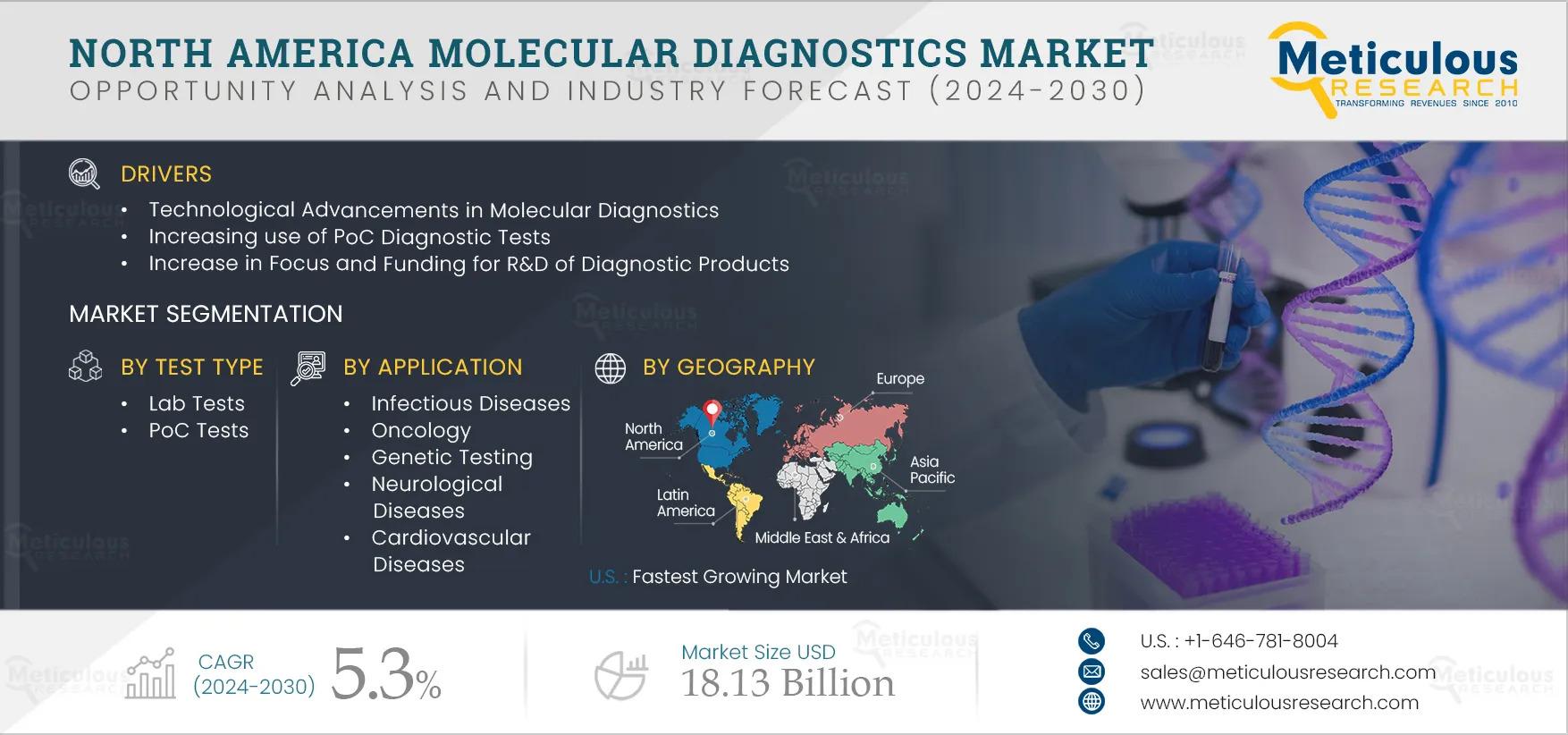Molecular Diagnostics Market in North America: Technologies, Regulations & Forecast to 2032

The North America molecular diagnostics market is undergoing significant changes and is expected to reach $18.13 billion by 2032. This growth is driven by advancements in technology, an increasing demand for better healthcare solutions, and the arrival of new diagnostic methods.
Anyone looking into the future of molecular testing needs to understand the critical factors and trends influencing this market. This article answers important questions about the direction of the industry, providing practical insights for everyone involved, from established diagnostic companies to emerging genetic testing startups.
Breakthrough Technologies Driving Market Growth
By 2032, several molecular technologies will play a key role in shaping diagnostics in North America. Polymerase chain reaction (PCR) and microarray platforms will continue to be essential, providing high accuracy and throughput for routine disease screening and genetic detection. However, the most significant growth will come from sequencing, particularly next-generation sequencing (NGS).
NGS is expected to show the highest growth rate in the region because of its ability to detect low-frequency variants and analyze large genomic areas comprehensively.
This technology allows for the simultaneous testing of multiple gene mutations, improving precision medicine and speeding up the development of personalized diagnostics. Hospitals, laboratories, and commercial service providers are already adopting sequencing for oncology, infectious diseases, and hereditary disorder panels.
Artificial intelligence (AI) and machine learning are becoming key components of the molecular diagnostics system. They help process data faster, automate interpretations, and support better clinical decision-making, ultimately increasing diagnostic accuracy and speed.
Infectious Disease Testing: A Revenue Powerhouse
Infectious diseases represent the largest application segment in North America, contributing the most to overall revenue. This persistent demand stems from ongoing threats such as respiratory pathogens (SARS-CoV-2, influenza, RSV), antibiotic-resistant bacteria, and new viral outbreaks.
The widespread use of molecular methods for COVID-19 and other infections has fundamentally changed testing practices toward rapid, high-volume diagnostics.
Lab-based molecular tests, especially multiplex PCR panels, are popular among hospitals and reference labs, boosting test volume and sales.
In the U.S., testing for respiratory diseases accounted for over 40% of the market share in recent years, and this trend is expected to continue as public health awareness and early intervention increase.
Explaining Variations in Forecasted CAGR
Forecasts for the compound annual growth rate (CAGR) of North America’s molecular diagnostics market vary among reports due to different underlying assumptions and methods. Factors causing these differences include varying expectations of policy changes, rates of disease emergence, speeds of technology adoption, and healthcare spending.
Some reports consider broader market segments or definitions (including point-of-care, viral, and direct-to-consumer tests), while others focus on traditional lab workflows.
Additionally, the speed of regulatory approvals, changes in Medicare policies, and the integration of new technologies (like CRISPR diagnostics and portable molecular platforms) influence growth projections, resulting in different CAGR estimates.
Regulatory Hurdles: Impact and Evolution
Challenging regulatory environments pose major barriers to market adoption. Getting approvals for molecular diagnostics often involves lengthy and complicated processes, particularly for new genetic tests or NGS-based panels.
Delays in FDA or CMS approval can slow the adoption of these technologies, affecting market entry and reimbursement. The high cost of following regulations, changing data standards, and frequent updates in coding and billing add to the difficulties.
Despite these challenges, recent policy improvements, such as wider Medicare coverage for next-generation sequencing in hereditary cancer, are enhancing access and encouraging innovation. Increased collaboration between regulatory agencies, payers, and clinical stakeholders is expected to simplify the approval process and speed up adoption by 2032.
Opportunities for DTC Genetic Testing Companies
Direct-to-consumer (DTC) genetic testing is becoming a promising sector in North America’s molecular diagnostics market. Growing consumer interest in personal genomics, ancestry, and preventive healthcare is driving this growth and creating opportunities for innovative companies offering at-home kits and digital health insights.
DTC companies can use advanced sequencing and microarray technologies to introduce new testing panels, from pharmacogenomics to carrier screening and wellness traits, while collaborating with telemedicine platforms and integrative care providers.
Clearer regulations and improvements in privacy protections will further support the growth of DTC genetic testing. Companies that focus on clear reporting, educating customers, and managing data securely are likely to attract a new generation of health-conscious consumers, boosting both revenue and market reputation.
In summary, North America’s molecular diagnostics market is set for significant growth, led by next-generation sequencing, infectious disease testing, and personalized medicine platforms. Successfully navigating regulatory complexities and taking advantage of technological and behavioral trends will determine success for both new entrants and established companies, making this market one of the most dynamic sectors in global healthcare through 2032.
Download Sample Report Here @
https://www.meticulousresearch.com/download-sample-report/cp_id=5642
Contact Us:
Meticulous Research®
Email- sales@meticulousresearch.com
Contact Sales- +1-646-781-8004
Connect with us on LinkedIn- https://www.linkedin.com/company/meticulous-research
- Art
- Causes
- Crafts
- Dance
- Drinks
- Film
- Fitness
- Food
- Jogos
- Gardening
- Health
- Início
- Literature
- Music
- Networking
- Outro
- Party
- Religion
- Shopping
- Sports
- Theater
- Wellness


